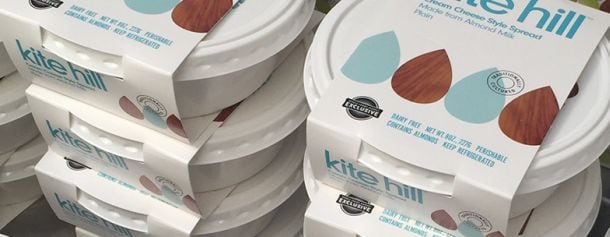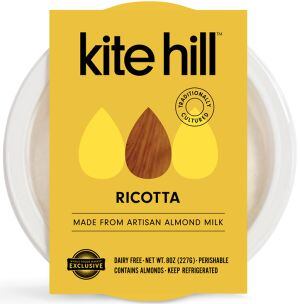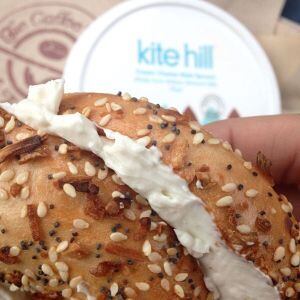The answer, according to Matthew Sade, CEO of Hayward, CA-based Lyrical Foods (d.b.a. Kite Hill), is pretty simple. “The products are not up to snuff.”
Until now, that is, says Sade, who runs a business often cited as part of a new wave of artisanal nut-based vegan cheese firms such as Miyoko’s Kitchen (California) and Treeline (New York), but is not, he claims, really competing with them, as Kite Hill is utilizing a completely novel – and patented - production process, and has bigger, bolder, cross-category ambitions.
Founded by vegan celebrity chef Tal Ronnen, cheesemaker Monte Casino and acclaimed Stanford biochemist Dr Pat Brown, Lyrical Foods also has some heavyweight VC backing in the form of Khosla Ventures (which has also invested in Hampton Creek and Instacart).
Its products (almond milk cheeses, cream-cheese-style cheeses, chilled ravioli, and shortly, cheesecakes) are in Whole Foods stores nationwide, plus several restaurants, and set to roll out to a wider customer base next year as Kite Hill ramps up its capacity to meet surging demand, Sade told FoodNavigator-USA.
Dramatic growth
"I’m very familiar with early stage food & beverage companies and let’s just say that we’re on a growth trajectory that is very uncommon." Matthew Sade, CEO Lyrical Foods (d.b.a. Kite Hill)
“We don’t disclose revenues, but I’m very familiar with early stage food & beverage companies and let’s just say that we’re on a growth trajectory that is very uncommon. It’s rare to be in a position where people are calling you asking for your product, so our immediate focus is increasing our capacity and scaling up production so we can increase distribution in the New Year.”

We’re not using nut pastes; we’re culturing nut milk into curds and whey
What really differentiates Kite Hill, however, is the combination of art and science at the core of its process, he said.

“We’re using completely new to the world technology married with age-old cheese-making techniques and equipment you’d find in any artisanal French cheese maker. It’s really a huge leap forward.
“We’re not using nut pastes; we’re making almondmilk and then we’re actually culturing the milk using proprietary cultures and enzymes [devised by Dr Brown] to separate it out into curds and whey.
“So the solids come from the cross linking of proteins, just like in [dairy] cheese. The ingredients are water, almonds, salt, enzymes and cultures, that’s it.”

We’re building a whole platform of products
More importantly, however, Sade – who most recently headed up marketing for meat-alternative firm Impossible Foods - did not join Kite Hill to head up a niche vegan cheese business.
“We want to change the entire dairy landscape, and we’re building a whole platform of plant-based products that will completely change how people view categories from entrees to cheesecake. Artisan cheese will be a very small part of what this company will become in the next couple of years.”
We’re not offering a lesser evil
The fact that the products sit in Whole Foods’ dairy case rather than in a standalone vegan cheese section reflects the retailer’s confidence that Kite Hill products are every bit as good as top quality dairy cheeses, he said. But just as importantly, it also reflects the company’s mission to appeal to a broader base of consumers, as well as removing any stigma around ‘vegan cheese’, which can conjure up unpleasant images of gummy blocks of vegetable oil and starch.

“We’re not offering a lesser evil. We want to reach people that enjoy eating [dairy] cheese to try a plant-based option and enjoy it so much they keep on buying it. If we want to have a fundamental impact on the food landscape we have to have a product that tastes so good that people that eat dairy would say this is a product I’d have any day of the week.”
Plant-based products that seek to make inroads into dairy and meat categories are not a fad or a trend, he added, but evidence of a permanent shift in buying behavior reflecting the “continual education of the American consumers about what’s good for your health, the environment and for animals”.
But are people really buying food products for such noble reasons? Yes and no, says Sade. “At the end of the day, people buy food based on taste and price,” he acknowledged, but if you can nail those two things and build a compelling story about health, nutrition or animal welfare, you are likely onto a winner.

Nuts and health
As for health, he acknowledged that some commercial brands of almond milk have come under fire for selling what cynics claim is mostly water, sugar and hydrocolloids mixed with a surprisingly small quantity of almonds, but says Kite Hill makes its own almond milk (almonds + water – with nothing added) as a base for its products, and uses significantly more nuts.
While dairy cheese is high in saturated fat, it also contains calcium, protein and many valuable vitamins and minerals, he acknowledged, whereas Kite Hill Cheese doesn’t have as much calcium, but has zero saturated fat.
But getting into arguments about the Nutrition Facts panel misses the point, he said. “Let’s take a big step back and acknowledge that the scientific literature consistently shows that people who consume animal products (meat and dairy) have a higher level of all-cause mortality and by eating dairy made from nuts, we are contributing to a lower level of all-cause mortality."
As for the price, Kite Hill has a very expensive raw material (almonds) and is a premium-priced product, but when it’s positioned alongside artisanal dairy cheeses, it is not out of step, he said, with prices starting at $7.99 per pack.
